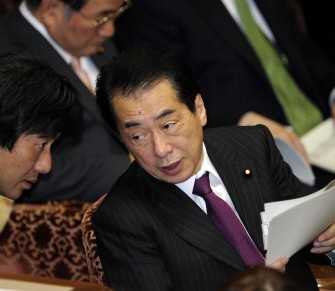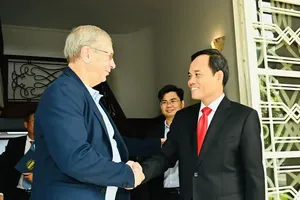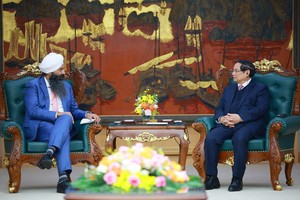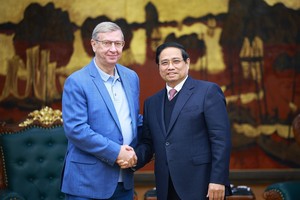TOKYO, March 7, 2011 (AFP) - Japan's centre-left premier on Monday vowed to fight on despite media charges that his government was "on the edge of a cliff" after the foreign minister resigned over a donations scandal.
Prime Minister Naoto Kan -- Japan's fifth leader in as many years, now battling low poll ratings and a split parliament -- said he would not call snap elections as repeatedly demanded by the conservative opposition.

"Many prime ministers before me have bowed out after short periods of time," said Kan, referring to the revolving-door leadership that is often cited as weakening Japan's governance and global influence.
"I believe it's desirable for the people and for the parliamentary system to have the people decide whether to change the government by judging the lower house over its full four-year term."
Kan took a blow Sunday when his foreign minister, Seiji Maehara, stepped down for illegally accepting about $3,000 from a 72-year-old woman of Korean background, a family friend who is not a Japanese citizen.
Under Japanese law, politicians are banned from taking money from foreign nationals, and the scandal has been all the more damaging to Maehara, who as foreign minister had taken a hawkish and strongly patriotic stance.
Analysts said Maehara, who had been tipped as a likely successor to Kan, had little choice but to step down over what many saw as a technicality, because of the stranglehold the conservative opposition has in the Diet legislature.
Kan's government is seeking to push a budget bill through the Diet, but the Liberal Democratic Party (LDP), which controls the upper house, will be able to block supporting bills, risking a government shutdown.
Kan -- who took office last June as the DPJ's second premier, and whose cabinet approval ratings have dropped below 20 percent in several recent polls -- woke up to hostile press coverage Monday.
The conservative Yomiuri said he "has been driven into a tight corner", the liberal Mainichi Shimbun asked whether DPJ rule "will collapse", and the Nikkei financial daily said the "government is standing on the edge of a cliff".
Maehara's resignation was sparked by a "trivial" sum of money, but it "made an already bad situation worse" for the beleaguered government, said Yoshinobu Yamamoto, political professor at Aoyama Gakuin University.
"Mr Maehara needed to step down, given that the rules are the rules, that his post was foreign minister, and that (the donation) provided a good cue for opposition politicians playing political games to attack him."
Yamamoto also told AFP that "if general elections were held now, I think there would be a chance of returning to LDP rule".
Shinichi Nishikawa, politics professor at Tokyo's Meiji University, said that, "viewed from foreign countries, the resignation must look bizarre. But there was no other choice considering the parliamentary situation."
For ambitious Maehara, the speedy exit meant "taking a step back to prepare for the future," Nishikawa told AFP. "He may have to bide his time for a few years, but it will be good for him in the end."
Maehara's departure spells a headache as Japan faces a busy diplomatic calendar, with G8 foreign ministers meeting in Paris next week and plans to host the foreign ministers of China and South Korea in Tokyo this month.
"Now diplomacy has to start from scratch again," said Meiji's Nishikawa. "It will make foreign countries think that they cannot deal with Japan."
Kan's right-hand man, Chief Cabinet Secretary Yukio Edano, said he would double as foreign minister for the time being. He assumes the post at a time of strained ties with neighbours China and Russia.
At home, meanwhile, the brutal battles in the Diet are turning off many voters, who elected the DPJ in a landslide in 2009 but who have shown little enthusiasm for either mainstream party in recent polls.
"The public is fed up with the feeling of despair and helplessness that is trapping them," said Nishikawa. "People are ending up not supporting any party and having no interest in politics."
























